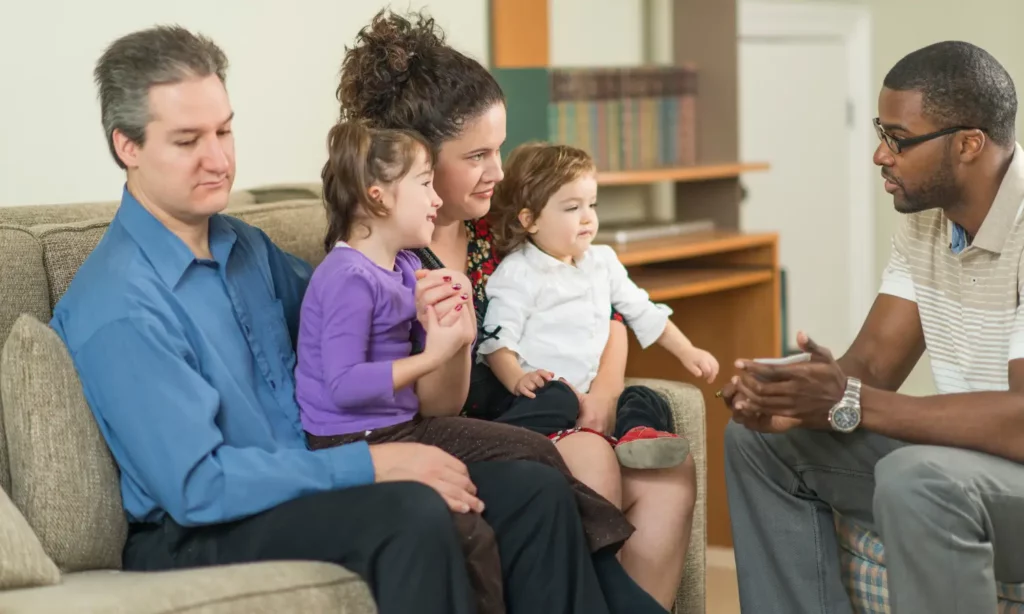In every family, there’s a unique blend of personalities, beliefs, and histories that come together to form a cohesive unit. But let’s face it, these very elements that make our family special can sometimes lead to disagreements, misunderstandings, and even prolonged conflicts. If you’ve found yourself thinking, “There has to be a way to bridge these gaps,” you’re not alone. In this blog, we’ll delve deep into the world of family counseling, specifically the benefits of seeking guidance online. Join us as we explore how this form of therapy can be a transformative force for families everywhere.
Contents
Signs That Tell When to Seek Family Counseling
 Recognizing when to seek family counseling can be challenging. Families often navigate through ups and downs, but distinguishing between typical family disagreements and deeper, unresolved issues is crucial. Here are some telltale signs that might indicate your family could benefit from professional counseling:
Recognizing when to seek family counseling can be challenging. Families often navigate through ups and downs, but distinguishing between typical family disagreements and deeper, unresolved issues is crucial. Here are some telltale signs that might indicate your family could benefit from professional counseling:
- Persistent Conflicts: If arguments and disputes become a daily occurrence, and no resolution seems to be in sight, it’s a strong indicator that external intervention might help.
- Breakdown in Communication: When family members start to avoid talking to each other or when conversations frequently lead to misunderstandings or hurt feelings, it signifies a need for better communication strategies.
- Major Life Changes: Events like divorce, death, relocation, or even adding a new member to the family can create stress and adjustment issues that counseling can help navigate.
- Children’s Behavioral Problems: If children in the family start exhibiting behavioral issues at school or home, or show signs of stress, depression, or withdrawal, it might be a reflection of underlying family tensions.
- Emotional Distance: If family members start distancing themselves emotionally, preferring to spend time away from home, or if there’s a palpable tension in the air, it’s time to consider counseling.
- Traumatic Events: Families who’ve experienced traumatic events, be it an accident, crime, or any form of trauma, can benefit from counseling to process the event and support each other.
- Substance Abuse: If a family member is struggling with substance abuse, it not only affects them but also impacts the entire family dynamics. Counseling can offer support to both the individual and the family.
If you recognize one or more of these signs within your family, it might be time to consider seeking professional help. Remember, family counseling is not about assigning blame; it’s about understanding, healing, and building stronger, healthier relationships together.
How A Family Counseling Can Help?

Family counseling, often referred to as family therapy, is a specialized branch of psychotherapy aimed at addressing and resolving issues that impact the family unit. It’s not just a platform for venting out grievances but a structured approach to mend broken ties, enhance relationships, and foster understanding. Here’s how family counseling can be of immense help:
Building Strong Communication
One of the primary goals of family counseling is to enhance open and effective communication. A counselor helps family members express their feelings and concerns in constructive ways, teaching them listening skills and ensuring everyone feels heard.
Problem-Solving
By identifying specific challenges, family therapy helps in creating actionable solutions. Through guided sessions, families can work collaboratively to solve problems, ensuring everyone’s needs and concerns are considered.
Strengthening Bonds
Therapy often involves team-building exercises and shared activities that help foster closeness and unity, rebuilding strained relationships, and nurturing existing ones.
Handling Transitions
Life events like births, deaths, marriages, or even moving to a new place can shake up family dynamics. Counseling assists families in navigating these changes, ensuring smoother transitions and minimizing stress.
Addressing Mental Health Concerns
If a family member is dealing with depression, anxiety, or any other mental health issue, family therapy can offer collective support, helping the family understand and aid in the recovery process.
Developing Coping Strategies
Life is unpredictable. Family counseling equips members with effective coping strategies to deal with external pressures, be it financial strains, societal challenges, or peer pressures.
Understanding Patterns
Families often have deeply ingrained behavioral patterns, some of which might be harmful. Counseling helps identify these patterns, understanding their origins, and working towards changing them for the better.
Rebuilding Trust
Betrayals, secrets, or misunderstandings can erode trust. Through therapy, families can work towards rebuilding this trust, ensuring a healthier and more harmonious future.
Enhancing Parenting Skills
Parents can benefit by understanding their children better, adapting their parenting techniques, and addressing any parenting concerns in a supportive environment.
Support During Crisis
In times of crises, be it due to external events, internal conflicts, or health challenges, family therapy provides a stabilizing force, ensuring families have the tools to support one another.
In essence, family counseling is like a guiding light, illuminating pathways in times of darkness, and ensuring the family unit remains strong, cohesive, and supportive, irrespective of the challenges thrown their way.
Top Benefits of Seeking Online Family Counseling
 With the advent of technology, online family counseling has emerged as a beacon for many families, providing numerous advantages over traditional face-to-face sessions. Let’s explore the benefits:
With the advent of technology, online family counseling has emerged as a beacon for many families, providing numerous advantages over traditional face-to-face sessions. Let’s explore the benefits:
- Convenience of Online Sessions
Gone are the days when families had to travel distances and juggle schedules to attend a therapy session. With online counseling, all you need is a device and an internet connection. Whether you’re in your living room, bedroom, or even on a vacation, therapy is just a click away. - Flexibility in Scheduling
We all know coordinating schedules for multiple family members can be a daunting task. Online family counseling provides the flexibility to book sessions at times that work best for everyone. Be it late evenings, early mornings, or weekends; the choice is yours. - Comfort in a Familiar Environment
Being in a comfortable and familiar setting can make a significant difference in therapy’s effectiveness. When family members are at home, they’re more likely to open up, express freely, and engage actively in the session, making therapy more impactful. - Broader Access to Specialists
With online counseling, geographical boundaries fade away. This means families have the liberty to choose specialists, not just in their vicinity, but from anywhere in the country or even globally. So, if your family requires a specialist in a particular niche, online platforms like TherapyMantra can connect you effortlessly. - Enhanced Privacy and Discretion
For some, the thought of bumping into a neighbor or colleague at a therapist’s office can be unnerving. Online therapy provides an added layer of privacy. Sessions can be attended from the comfort of one’s home, ensuring utmost discretion.
With platforms like TherapyMantra offering a vast array of specialized therapists, families can now find the right fit seamlessly and benefit immensely from online family counseling.
Approaches & Techniques Used During The Sessions
Family counseling is both an art and a science, employing a plethora of approaches and techniques to facilitate healing and understanding. Here’s a quick rundown of some commonly used methods:
- Systemic Therapy: Views the family as a single emotional unit, aiming to change the system of interaction among family members.
- Cognitive Behavioral Therapy (CBT): Focuses on identifying and correcting dysfunctional beliefs, attitudes, and patterns of behavior within the family.
- Narrative Therapy: Helps family members reframe their narrative, focusing on strengths and solutions rather than problems.
- Solution-Focused Therapy: Instead of delving into the root of problems, this approach concentrates on finding immediate solutions and harnessing the family’s strengths.
- Structural Therapy: Aims to restructure the family organization to solve individual problems.
- Communication Techniques: Enhances open dialogue, teaching family members to express and listen effectively.
- Role-Playing: Allows family members to step into each other’s shoes, promoting understanding and empathy.
- Genogram: A visual representation (similar to a family tree) used to explore family history and patterns.
By blending these techniques, family counseling offers a tailored approach, ensuring every family finds their unique path to harmony and understanding.
Conclusion
Every family encounters challenges, but it’s how we face them that defines our relationships. Counseling provides the tools and guidance necessary to navigate these challenges and strengthen familial bonds. With the added convenience and benefits of online therapy, it has never been easier to seek professional guidance from the comfort of your own home. If you’re facing family issues and seeking a way forward, remember: you’re not alone, and help is at hand. If you are looking for Online Family Issues Counseling, TherapyMantra can assist you. Book a trial Online therapy session today and embark on the path to healing and understanding.


